Susan Eccles - Drone Legalities for Roofing Companies - PODCAST TRANSCRIPTION
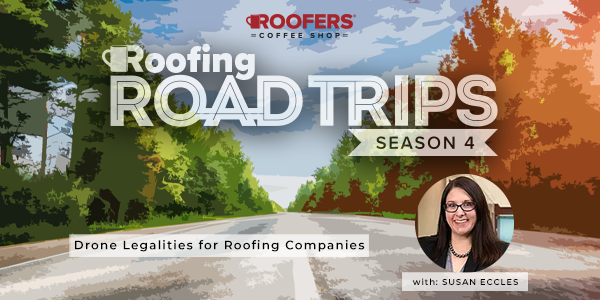
Editor's note: The following is the transcript of a live interview with Susan Eccles of Adams & Reese. You can read the interview below or listen to the podcast.
Speaker 1:
Welcome to Roofing Road Trips with Heidi. Explore the roofing industry through the eyes of a long-term professional within the trade. Listen for insights, interviews, and exciting news in the roofing industry today.
Heidi Ellsworth:
Hello and welcome to another Roofing Road Trips from RoofersCoffeeShop. My name is Heidi Ellsworth, and I'm road tripping today to meet someone new to maybe to our world RoofersCoffeeShop, but not new to construction. I am here with Susan Eccles, who is a special counsel for Adams and Reese, we are so excited to have you here, Susan, welcome to the show.
Susan Eccles:
Thank you, Heidi. And thank you all for having me today.
Heidi Ellsworth:
Yeah. And you know what, Susan, I would love for you to introduce yourself, and tell us a little bit about Adams and Reese, because Adams and Reese has really come on in a big way this year in the roofing industry.
Susan Eccles:
Yes. So good morning everyone. My name is Susan Eccles, and I'm an attorney in the Baton Rouge office of Adams and Reese. My law practice focuses primarily on construction, licensing and government procurements. I've been with Adams and Reese for three years now, and Adams and Reese is a full service multidisciplinary law firm. And we are primarily located within the southern part of the United States. We have 21 offices in seven states in the District of Columbia. And what makes our firm special is we focus on partnering with our clients to understand their concerns and address their future strategies, not just what is currently going on with them.
Heidi Ellsworth:
For those listening, Adams and Reese, Trent Cotney has joined Adams and Reese this last year in a merger. And so we're getting to meet all these new people like you, Susan. It's very fun. I love it.
Susan Eccles:
Yeah, and for me, it's been such a great addition to the team, bringing all of their knowledge. And especially in the roofing world, they have a lot of expertise in that field as well.
Heidi Ellsworth:
They do. For our listeners out there, can you talk just about... You say special counsel, so what's that role of special counsel?
Susan Eccles:
I've been an attorney now for 17 years, and I know it's gone by a lot quicker than I dreamt. So in that role, I advise throughout the discipline [inaudible 00:02:38] in a construction project. So owners, insurance companies, sureties, subcontractors, equipment suppliers, if you fall anywhere in the realm of participating on a construction project or providing materials or equipment to a construction project. I have advised clients along that spectrum. And it has been very interesting learning about the various issues that can arise on a project, and whether it's working on ensuring that the client has a proper licenses, because that's something that we see here in South Louisiana a lot, is that we'll have a hurricane. There's all of a sudden, a mass amount of work that can't be done by... Let's say it's a hurricane, so you need roofers.
Heidi Ellsworth:
Right.
Susan Eccles:
Right? And there's a mass amount of work done, and the Louisiana roofers could never complete all of that work to have a roof on everybody's house in an immediate timeframe. So other people want to come in from other states, but be cognizant of what those licenses requirements are. So we can help contractors address those, and make sure that even if you are a Louisiana contractor, you have the licenses to then perform roofing work, is that something you're able to do? So we deal with contracts, we deal with licenses, we deal with defects when projects go awry or maybe they're now material escalation issues because of inflation and COVID, and all of the things that have really just arisen in the past three years that just came out of left field.
Heidi Ellsworth:
It is. I mean-
Susan Eccles:
There's no typical day, but that's what makes it interesting. And we're constantly learning.
Heidi Ellsworth:
Good thing. There are so many things that have happened between material shortages, price increases, COVID. But one of the things that's out there that has been consistent and it's only growing, growing, growing. And that's the use of technology on the construction site. And so I was excited to talk to you because you've really done a lot of focus on drone usage, and the legalities of that. So maybe talk a little bit about that and what you're seeing with drone usage on construction sites, and what contractors should be aware of.
Susan Eccles:
Yes. And the getting new technologies in place on construction projects is exciting. And for the roofing industry, I think it's a great way for roofers to assess and evaluate the current roof on the property, without having to send someone up on a roof, that could potentially be a hazard. You don't know what you're necessarily dealing with, especially if there was a storm or some type of recent event that caused a lot of damage. Whether you're in an industrial facility or you're dealing with someone's residence. So I think there is a huge opportunity here for contractors to utilize this new technology for inspections. That there are large contractors that even utilize these to inspect equipment such as cranes. So instead of having to then lay a crane down, which runs a risk of injury to people on the grounds to get it inspected, they're able to just send the drones up in the air and inspect the crane.
Heidi Ellsworth:
That's so cool.
Susan Eccles:
Yes. And it saves time because they're not having to then lay the crane down, and bring out a crew to then inspect the crane, but they're able to just contemporaneously inspect a crane. And the way they do it is with what's called a beehive. So they send several drones up, and they fly like bees would around the crane.
Heidi Ellsworth:
Wow, that's cool.
Susan Eccles:
Yes, it's really cool. But for our roofer friends, it would look more like you have a pilot on your company team, because only a certified pilot can fly drones legally in this commercial application. So unfortunately, sometimes what we see happen is that someone gets a drone for Christmas or their birthday, and they're working on a really cool construction job. Maybe they're doing site work, and they're putting in a lot of really neat foundations and walls, and like, wouldn't it be great to have this on camera? I would love to have an image of this.
Well, then they send that drone up, but they're not certified to fly it. They're flying over people with large equipment at work, and sometimes the drone falls out of the sky, and things happen. So that's what we do not want to see happen here. So make sure if you are going to have a drone program... And it's a really cutting edge to be on. So it's exciting and we want these drone programs to grow. But that you do utilize a licensed drone pilot as a member of your team. And then if we think back to that example of a hurricane, well, think about how many homes you can look at in a single day by sending up a drone to do your estimate, as opposed to having to have manpower get out, measure, get on the roof, the drone can do all of that.
Heidi Ellsworth:
Right.
Susan Eccles:
And much more quickly. And then the return on investments. Once you start thinking about how you can utilize these in your business, the return on investment is significant.
Heidi Ellsworth:
That's good. So first of all, just being in the roofing world, I always think about, okay, yeah, you're flying because you want to look at the roofs and everything. But I love that on the larger construction sites, that there's so much more. I mean, that they can check out for safety, for cranes, inspections, the whole nine yards. What kind of adoption are you seeing with your clients in drone usage?
Susan Eccles:
So we're seeing insurance companies encourage drone usage, and looking into what type of drone programs our clients have when they're up for insurance renewals, and as part of underwriting. And maybe they don't get an insurance discount, but they don't get an insurance increase. Because now they have this new program in place. And what the benefit of this is, is that you're able to track a project over time. So let's say that you're hired to install a roof on an industrial facility. So then you can fly your drone up, it can image what that building looked like. You capture the whole building, so that way if let's say the owner claims that there was damage caused by one of your workers to the building, well, you have an image of exactly what the entire building looked like before. To be able to say, nope, this was in a state of disrepair before.
Or that, yes, maybe there is a change in some circumstances, something did happen. But you're able to capture that. And then you're able to capture the work as it's performed, and you know exactly how it was sequenced, and at the completion. And that can be used years down the line where it's alleged that there was a defect, maybe that the wrong material was used. Well, you have images of all of your work, but that's a potential problem as well, because now you have to maintain those images.
And instead of just having your project manager go out and shoot five shots on a digital camera, these drones take hundreds and thousands of images, and it's a lot of data. So that's something that you have to contemplate dealing with as well, as how that data's going to be stored, how long are you going to preserve it, what are your contractual requirements to preserve it? Because that's one of the things that's very helpful if you're looking at a construction defect claim, rarely do they arise at the same time you're doing the work. Usually, you get the call, and you've already left the site. So it's just a matter of time of, okay, how long, do you still have that data? And that would be vital if it's alleged that you installed the roofing incorrectly, well, you've got all these images, and you can show exactly what happened.
Heidi Ellsworth:
Right. Wow. That is so... I mean, a lot of what you've done too is looking at the whole job site, but even for roofing contractors on having that imagery stored and in place, so that if anything comes back later on the job overall, they can show that they followed the specs or they followed the engineering whatever was required.
Susan Eccles:
Exactly. And this is exactly how they put it in, this is what it looked like before, this is what it looked like after. These are the measurements, because the drone is taking all of that, you could image even... There're various different type of the imagery it can take as well. So it's phenomenal what they can do, and I think it's going to be a really big tool in the years to come.
Heidi Ellsworth:
Yeah. And what would you say, I mean, would you say a handful of your clients you're seeing using drones, or is it getting closer to that 50% mark?
Susan Eccles:
It really depends on the size, Heidi. The smaller contractors aren't necessarily using this. With respect to roofers, we have seen it a good bit when it comes to hurricane roof evaluations, because I think it's quicker for the roofers to move from site to touch site, to try to get additional business. So I have seen a good bit of drone images when it comes to large scale facilities that have had roof damage caused by the hurricane. We've seen that in several instances. But I think it's just really kind of the size of the contractor. So if it's a small mom and pop, you don't usually see drones. And if you do see them, well, there's probably not a licensed drone pilot that took those photos. So thinking of looking at-
Heidi Ellsworth:
There's a bit of a worry there.
Susan Eccles:
You're right. Not only do we have an FAA violation, but was that drone even calibrated properly? Was the software up today? Those are some concerns that you have there. But as the contractor gets bigger, then you usually see a contractor that may outsource its drone program so that they have contracts with pilots to come out and fly. They don't necessarily have their own internal program where they have pilots on their staff.
Heidi Ellsworth:
Right.
Susan Eccles:
But then you get to the point where you've grown some more, and it becomes more cost effective to have your own drone pilot. And it's not very expensive to put someone through drone pilot school. A lot of local bot tech schools have them community colleges, your drone certificate, you can earn that online. And then you take a test after. So it's not a very lengthy process to get the Part 107. So it may be worthwhile to send one of your current more learned and trustworthy workers, hey, I'd like you to go get your drone certificate. But it is worth that time, energy, and money to get them the drone certificate to not get an FAA fined. Because you do not want to get fined by the federal government for flying a drone. Or you get caught flying an airspace that you don't need to be in. And all of a sudden you have the sheriff's department out there because you're too close to an airport. There are things that you need to know to fly drones properly
Heidi Ellsworth:
That's perfect. I was going to ask you about that, about the regulations. And so making sure, you get a license pilot that they go through drone school, they understand proximity to aerospace for things. What about privacy? Is that something that they should be worrying about?
Susan Eccles:
Well, each state also has its own gap fill measures as far as where you can fly. But after COVID, and really the past three years, we've seen people not be as concerned about privacy, and be concerned more about efficiency and timeliness. Like Walmart is now doing drone delivery of certain food items. You can get a very small order delivered through drone, and it's through several cities that they're testing this in. And it's only going to grow, because people want things quickly. And I think as you see drone delivery of your packages through Amazon at one point, and drone delivery of your groceries, then it's going to be more acceptable and people are going to be less concerned that a drone's flying over my house and spying on me. But if you're using it properly on your construction project, you can put up signs that drones will be utilized.
So people are on notice that they will be captured by a camera. And I think in the day and age we live, our lives are captured by camera, whether you're driving in a car or walking down the street. So I think put people on notice if it's a large job and you're going to be flying drones up, you need to know if you need a waiver based on certain activities that you're doing. But I do believe since we've seen COVID and the expansion of drones involved with delivery, that whole fear of somebody spying on me in my backyard's kind tapered off.
Heidi Ellsworth:
That's good. Because a couple of years ago, that was a big deal. You're right, before COVID. Yeah, it was a big deal.
Susan Eccles:
Yeah. The fear, somebody's going to fly a drone over my pool and take a picture of my child in the backyard. That was the big fear. And they're going to have to shoot it down with a gun.
Heidi Ellsworth:
Yes. I was going to say that.
Susan Eccles:
Slowly progressed to, now how soon can the drone get my milk that I forgot to order from the grocery store so I could feed my child dinner tonight?
Heidi Ellsworth:
Right. Yeah. And that's amazing. I live out in The Boondocks of Oregon, so it's probably going to be a long time before we have drones delivering. But it is, it's happening so fast, and all of these types of technologies are being adopted. And kind of going back to what you said, I know in the roofing industry, the really large commercial contractors usually have a pilot as someone trained. And their work, because they're working with GCs, and they know that they need to put all that together. But for some of these up and coming companies, that maybe they're not ready to have a full-time person trained or anything like that, and they're looking at these contractors to come in, what are some of the questions that they should ask? Or what are some of the things they should be concerned about as they're talking to some of these contractors?
Susan Eccles:
Yeah, so I would ask about their experiences, references. Are they familiar with working on these types of projects? There could be people that specialize in certain areas. Also, what do their contracts look like? What are they promising to do? Who's going to be responsible if this goes wrong? Who's keeping this information? So one of my concerns is always that you're going to need this data in 10 years, and it's going to be pulling out a Betamax, and you're going to try to figure out how to play that. What do I do with a VCR tape or Betamax if I want to get information off of that? That's impossible. So ensuring that, that data stays accessible. Because that's why you're taking it, is just you may need it in the future. So have those discussions, and who's going to pay for that?
Heidi Ellsworth:
Yeah, the storage, everything to keep it.
Susan Eccles:
And is it subscription? Is it something that stays on their cloud? Does it stay with you? Are you transferring it to the owner, and they're going to maintain it? Now who's responsible? What if it can't be accessed? Who's liable for that?
Heidi Ellsworth:
Right. Well, and I think also as you're looking at it, like you were talking about the drones being able to measure and to be able to do stuff, that takes special software with the drone. The drone could take the pictures, but then you have that special software. So those are some things too. Actually working through the whole process of this is my end goal. My end goal is to have imagery with measurements, and 3D models that we can have before and after photos, whatever your goals of that project may be.
Susan Eccles:
Correct.
Heidi Ellsworth:
Contractors need to ask those questions to make sure they're going to get that in the end, and not just-
Susan Eccles:
Yeah, and don't assume. Yeah, don't assume that you're getting it. Don't assume that they're going to be responsible for keeping it for any amount of time, or that it's going to have the ability to be accessed as their system upgrades and software upgrades. Ask those questions.
Heidi Ellsworth:
And there's a lot in there. And we're going to be having some of these tips and things. I mean, even from this, we're going to be talking about that on the site, to help people with those drones. So Susan, we'll be reaching out to you on that to make sure we-
Susan Eccles:
Happy to help you guys.
Heidi Ellsworth:
... get that out there for everybody. I think we've really kind of covered this, but maybe to go over that bigger picture just of kind of steps for contractors, should contractors who are looking to incorporate drones into their business, is this something they should check with their legal counsel first? And what's your recommendation for them to get started?
Susan Eccles:
Yes. Meet with your counsel, and let's talk about building out a drone program for your company. And whether it's, you're going to outsource it. Well, then what do those contracts need to look like? Because you're going to have a relationship with another party, and you have expectations as to what they need to do. And maybe you have flow down provisions that are coming from the general and the owner's agreement, where you have to do certain things. So ensure that the agreement then with your drone service provider incorporates the requirements that you have that are already being flown down to you. As well as liability. If things go sideways and you can't access that data, and what are their warranties for that work they're performing?
Then you also need to address issues like OSHA. What happens if this person gets hurt on your site? So it's really an entire program, and you can start small with your agreements when you're outsourcing. But then as you grow and you develop it internally, how does this impact your safety plan? And when you have meetings, we need to address, okay, guys, we are flying a drone today. This is where the drone is going to go. Now how do you document that? Placing signs on the job site, just building out this program to tie in with the various other safety program and job protocols that you already have in place, that the drone will touch on.
Heidi Ellsworth:
And if you are thinking about incorporating this just with somebody, maybe you're an owner and you love to do this kind of stuff and maybe a drone, then that's a different plan that you got to make sure you get all the licensing.
Susan Eccles:
Exactly. Right, well, depending, Heidi, where you are in the chain of things. If you're an owner, you'd have different expectations than if you're a subcontractor, or if you're the general. So your expectations are very different depending on whose shoes you're standing in. But you need to address upfront, I think on every project, are we going to use this technology? And if so, we need to ensure that we are complying with federal and state law, and we don't have random drones being flown on our job. Because nobody wants to be fined by the federal government, and the fines are sizeable. Usually, well over $25,000 and that can be like per flight. So it gets expensive. And you don't want to make the news for being the person busted in your industry for flying a drone.
Nobody wants to be that company. So ensure that you're compliant with the regs, and then let's make this job site safe. Let's notify our insurance company that we do have this robust program because that's going to save us money. And then think about how we can use these drones to make this project more efficient. If we're not having to send guys up on the roof every time to take pictures, well, that's saving us time and it's saving us money. And it also reduces the risk of someone falling off that ladder.
Heidi Ellsworth:
Right, right.
Susan Eccles:
You also don't have to bring that scissor lift in, right?
Heidi Ellsworth:
Yeah, lot of cost savings.
Susan Eccles:
There's cost savings. So I think there are a lot of new technologies out there, and I do see drones as being one that's here to stay.
Heidi Ellsworth:
Here to stay. One last thought on that too, along with checking with your legal counsel, your safety, whoever that may be. Also checking with your insurance companies, right? Because there may be some benefits.
Susan Eccles:
There may be benefits. And then your policy may not cover drone flights, so you may need to get separate coverage for drones. And there are insurance companies that specialize in only drone coverage, and you can get it online fairly cheap. So it's worth having if you are going to have this program. And that's something you can talk to your insurance broker about as well. But I think if you do decide to go down the road of developing a drone program, you do have some upfront costs associated with that. Your pilot or your cost of your outsourcement. And you can pass some of these on, on the project, but I think your return on investment will come fairly quickly.
Heidi Ellsworth:
I love it. I love it. Susan, thank you. So interesting. This is great information.
Susan Eccles:
Thank you so much for having me.
Heidi Ellsworth:
Yeah, thank you for being on the show. We'll look forward to having you back. Let's talk about some more technology as we go forward. I love this stuff. So thank you again, Susan with Adams and Reese. We are going to have more of your information up on the site. We're doing a lot of stuff like this, so everyone out there, be sure to visit the directory for Adams and Reese, and see what they have going. I mean, really progressive items that are going to be so important for your business. So one last time, Susan, thank you so much for being here.
Susan Eccles:
Thanks guys.
Heidi Ellsworth:
Thanks. And thank you all for being here today. This is the kind of stuff we want to bring to you every week to help you grow your business and protect your business as the risk is out there. So be sure to listen to all the podcasts that you can find them on RoofersCoffeeShop, under the read, listen, watch, navigation, or on your favorite podcast channel. Be sure to subscribe and hit that notification so you don't miss a single episode. And we will be seeing you on the next Roofing Road Trip.
Speaker 1:
Make sure to subscribe to our channel and leave a review. Thanks for listening. This has been Roofing Road Trips with Heidi from the rooferscoffeeshop.com.













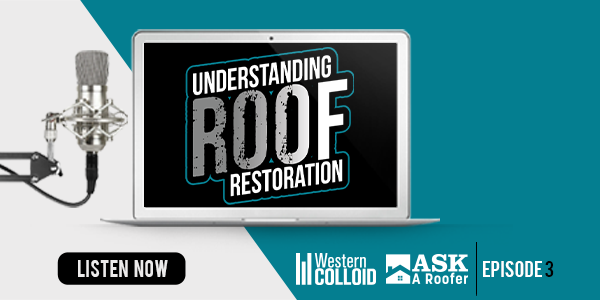
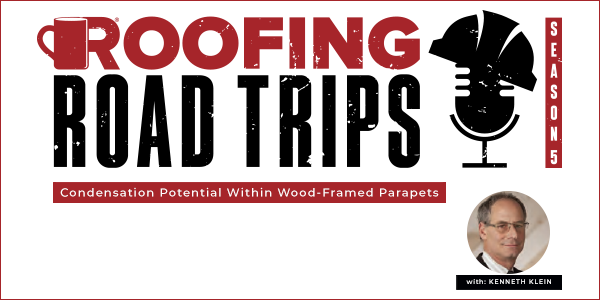
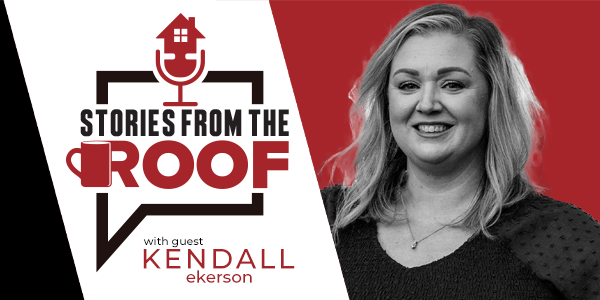


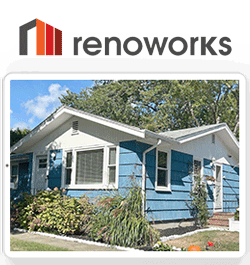

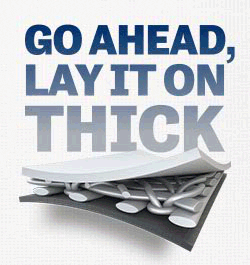

Comments
Leave a Reply
Have an account? Login to leave a comment!
Sign In